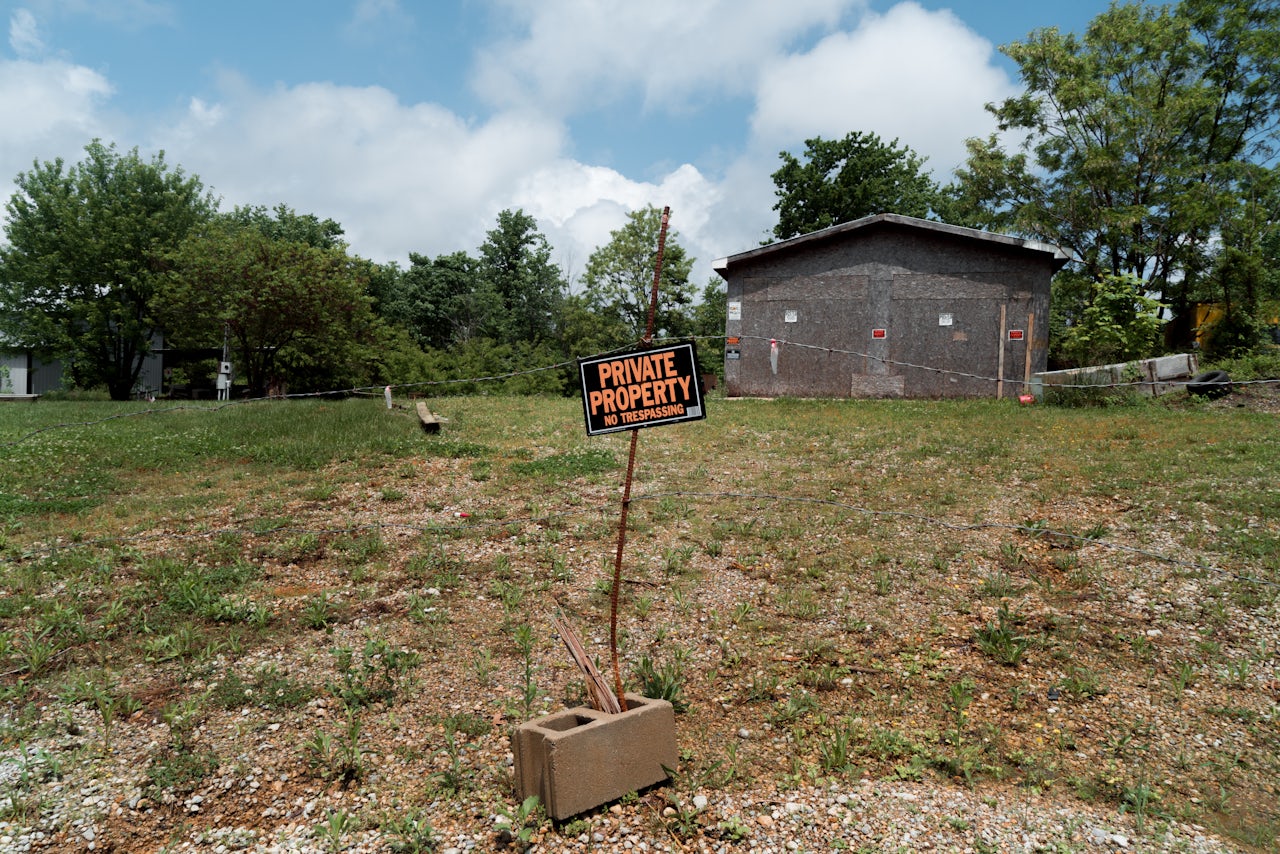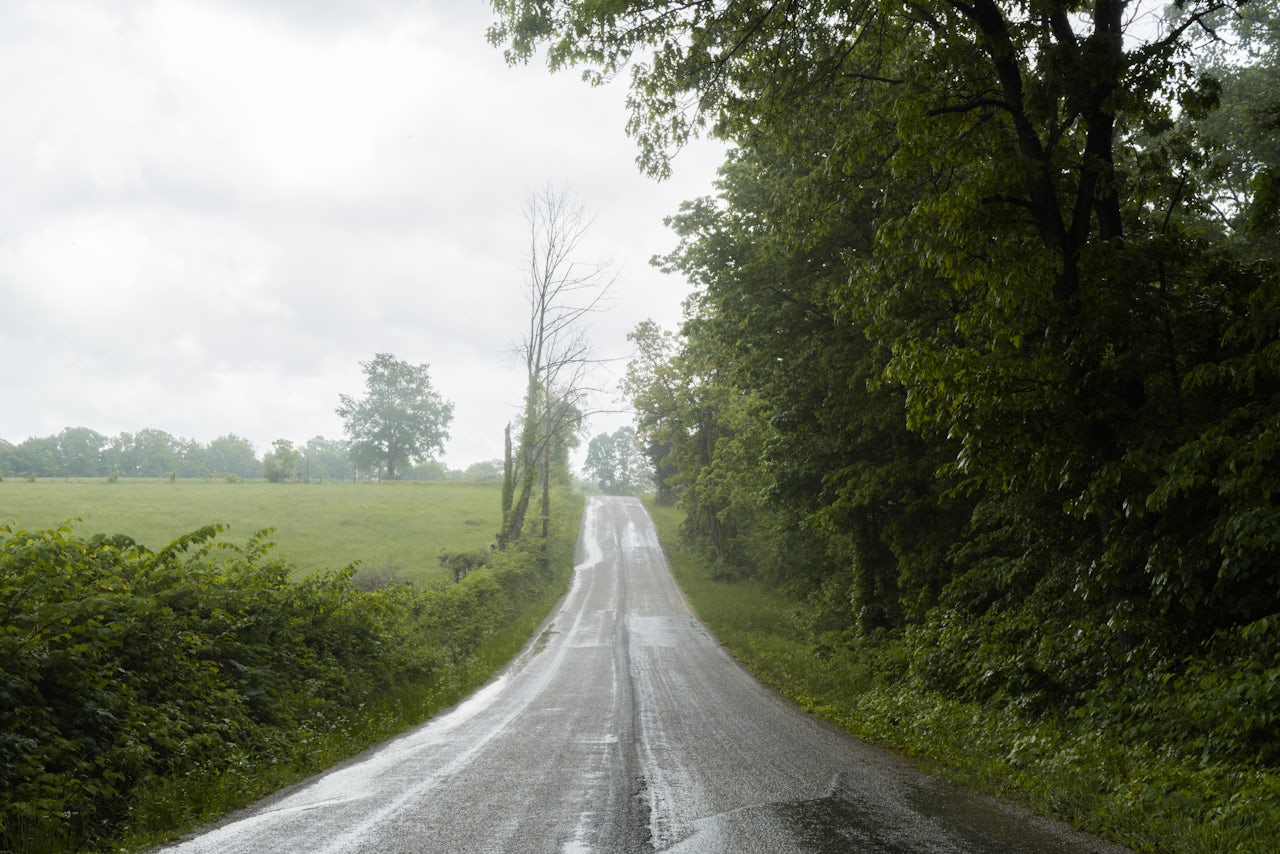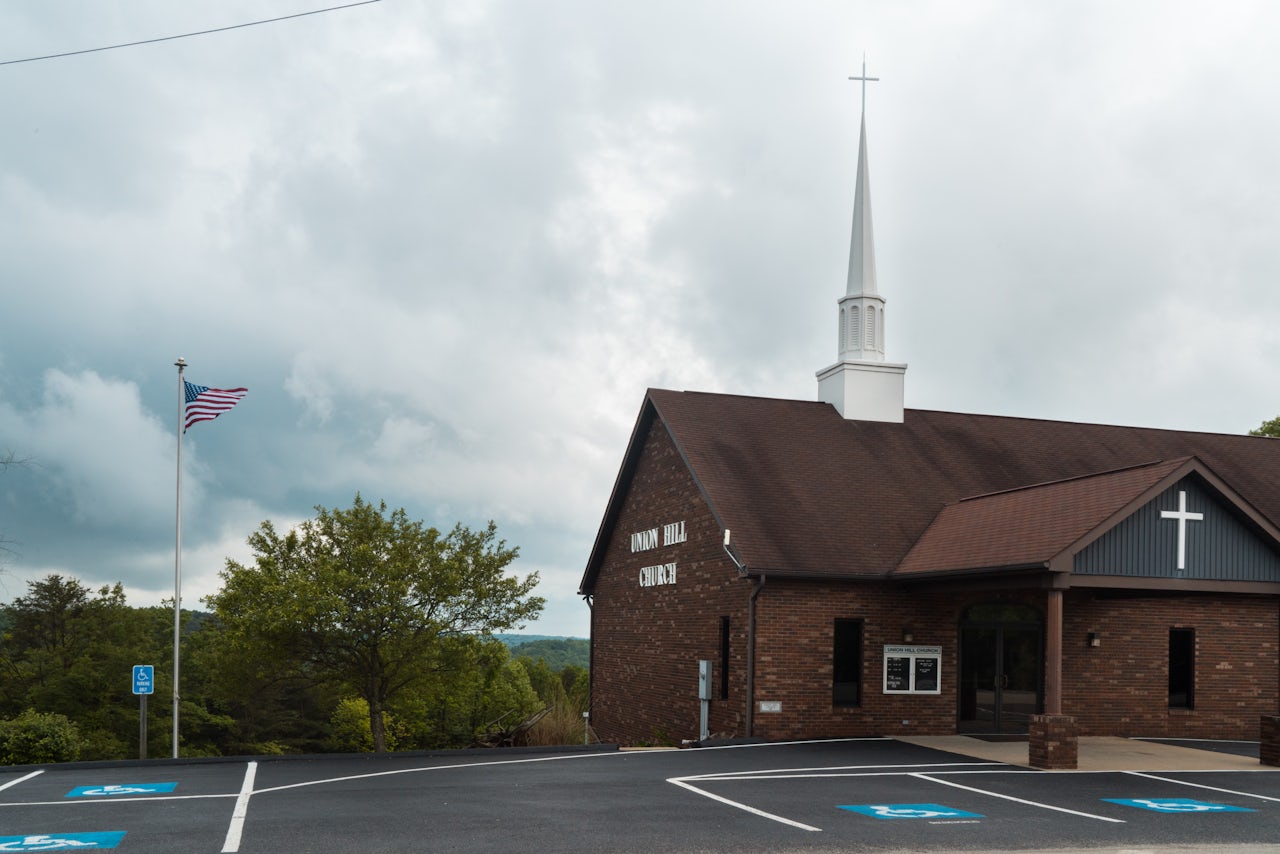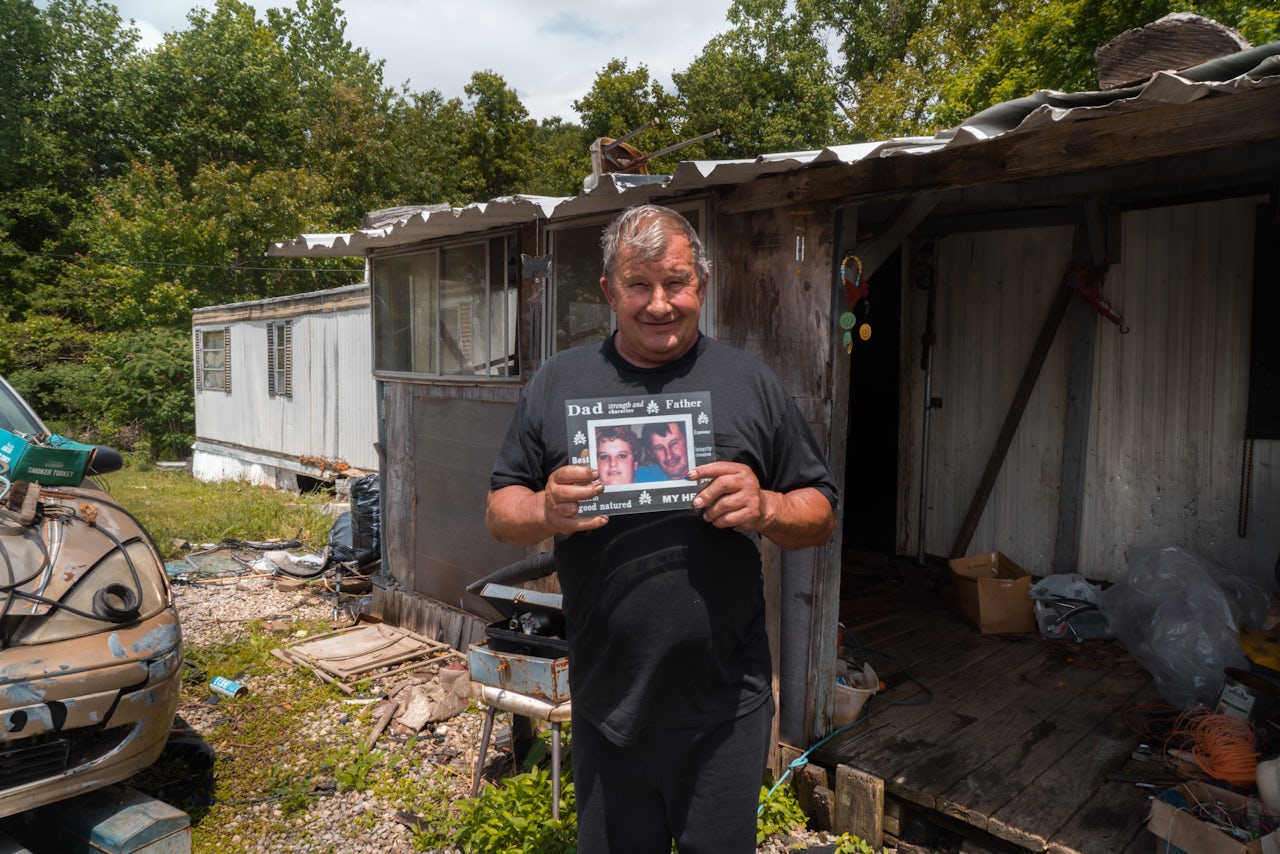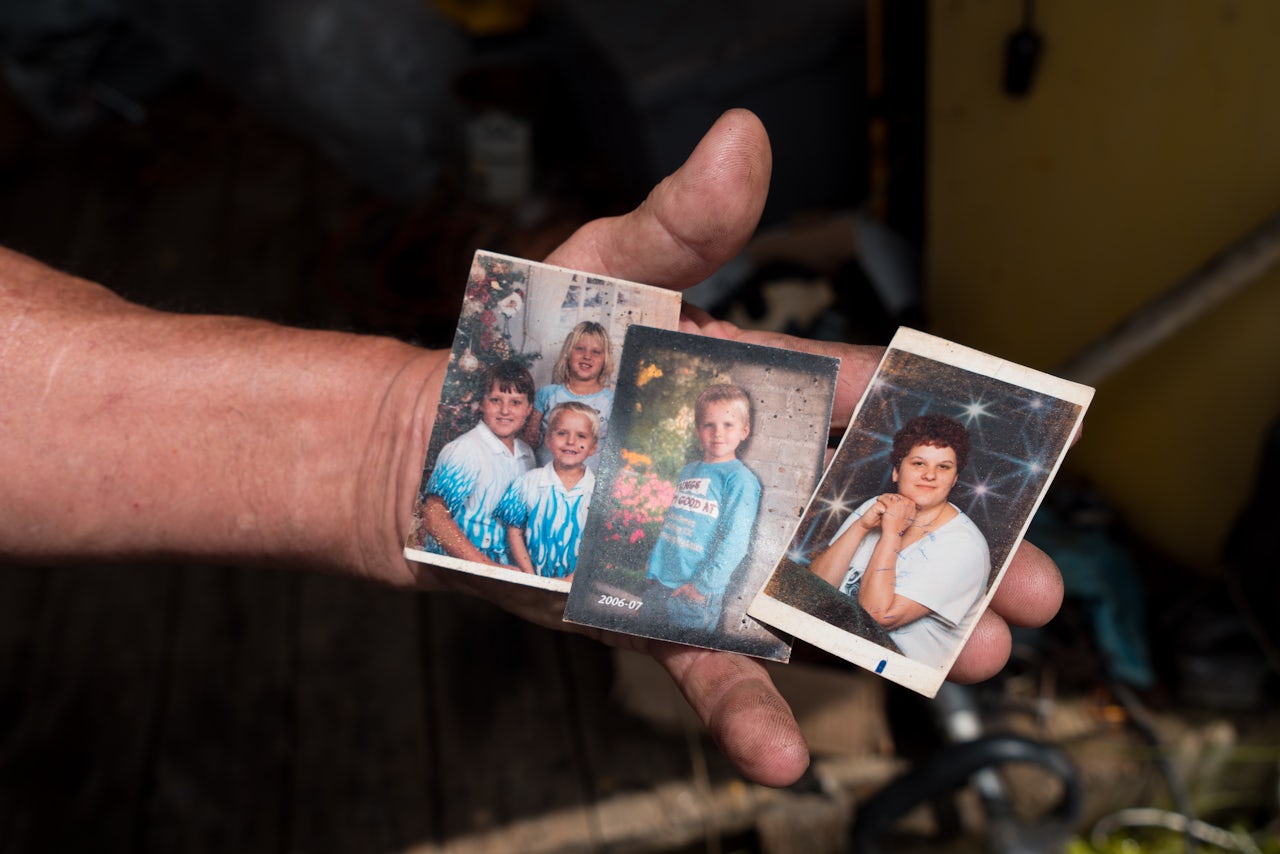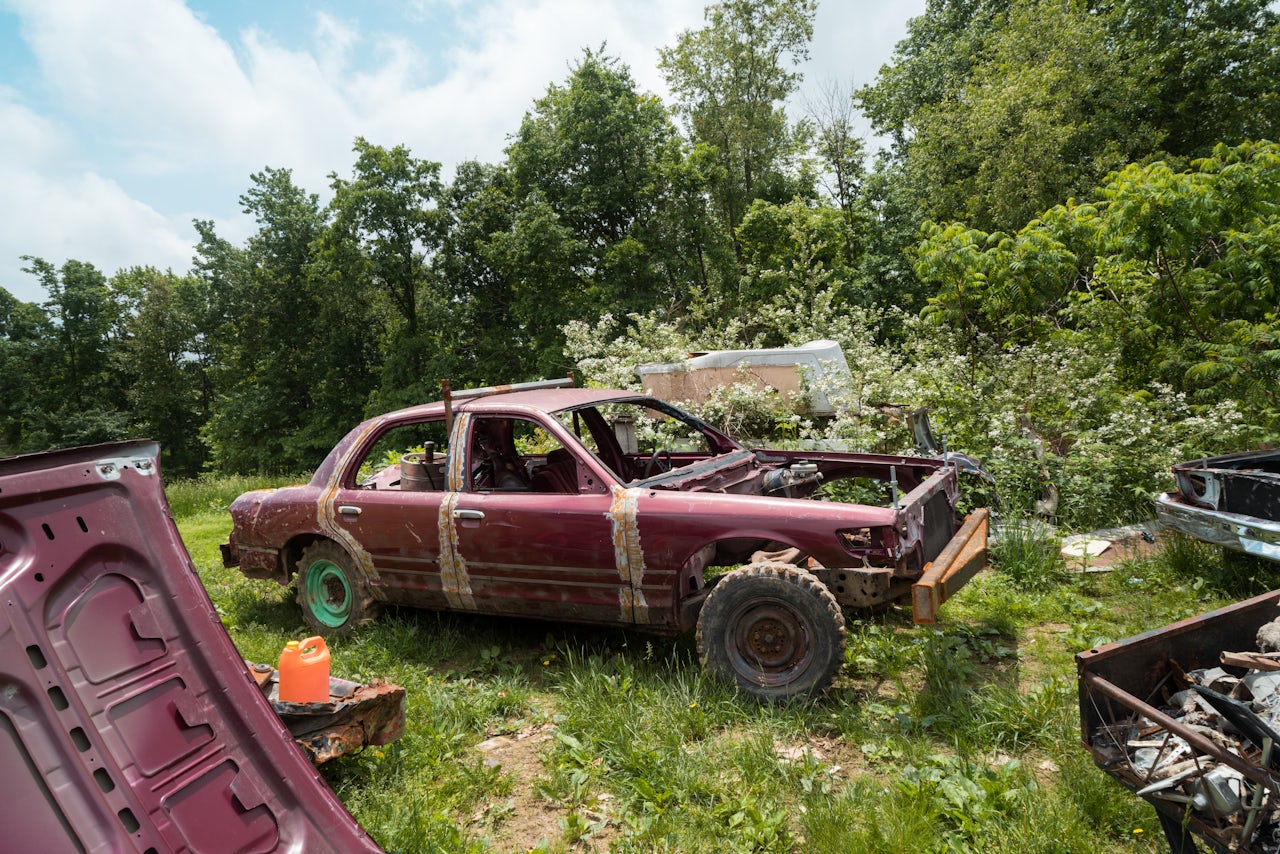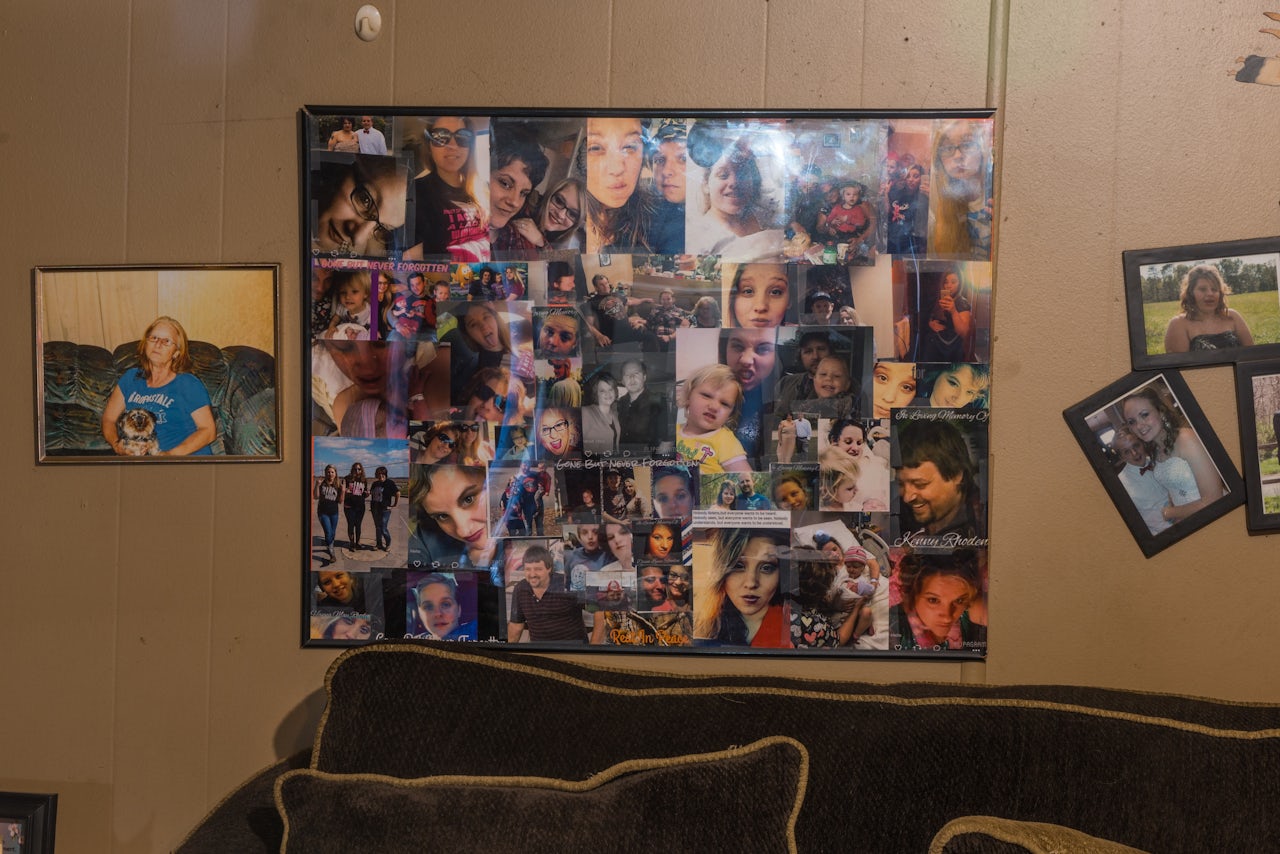The day Bobby Jo Manley pulled up to the Rhoden family property in April 2016, she saw two pitbulls. One of them was plopped down in a recliner. There was something funny about that. The dogs didn’t usually stay outside.
Inside the three mobile homes on the property, seven Rhoden family members were dead, except for the three babies. Shots to the head, mostly, executed some time between midnight and sunup in their respective homes. The property is a couple miles down Union Hill Road right off SR 32 — the James A. Rhodes Appalachian Highway— just past the small, green sign that reads, “Entering Pike County.”
When I drove up to this part of Ohio from Tennessee this past April, I’d passed the road without even realizing it.
One trailer on the Rhoden property held Christopher Sr., 40, and his cousin Gary, 38. Sr.’s oldest son, Frankie, and his fiancée, Hannah Hazel Gilley, both 20, lay in the adjacent trailer. Frankie’s three-year-old opened the door for Bobby Jo, and there in the bedroom was the couple’s own six-month-old, laying between them, alive. Sr.’s ex-wife, Dana (Bobby Jo’s sister), 37, and their youngest children, Hanna May, 19, and Chris Jr., 16, were killed in a trailer down the way. Dana’s days-old granddaughter (Hanna May’s with Charlie Gilley, Hannah Hazel’s brother) was there, too, spared from the bloodshed. Christopher Sr.’s brother, Kenneth, 44 — found in his trailer later that day, a short drive from the property — brought the final body count to eight. He got it the cleanest: a single gunshot to the head.
By noon that day, authorities had blocked access to Union Hill Road and cordoned off the property, a sprawling collection of junkers, and heavy equipment; a huge metal barn; some farm animals; and dogs.
“Whoever done it knowed the family … cause those dogs would have eaten them up." That’s how Leonard Manley (Dana and Bobby Jo’s father) put it to Inside Edition later that month. It’s how he put it to me when I visited. It’s about as good a clue as there is, even now.
The Pike County Murders. The Rhoden Family Massacre. Doesn’t matter what you call it. Both serve as catchy shorthand for the brutal, backwoods tragedy that seemed straight out of an Appalachian noir.
Outsiders swooped in long enough to describe folks as people who “idly smoked cigarettes,” or dressed in camo, with funny ways of “lookin’” or “talkin’.” The rural poverty, crime, and general misery served as a perfect backdrop for a stereotype. This was the biggest thing to happen to people outside the area since forever. After a couple feastful weeks, though, the crows flew home.
So how does a family, a community, move on from such notoriety, without ever being allowed to live beyond its image? Hard to say. There’s a funny balance. Locals aren’t too keen on strangers. I can’t say I blame them.
But you can’t blame folks for being curious, either.
This wasn’t only the largest mass murder in Ohio’s history. Behind the massacre at Pulse Nightclub in Orlando that June, it was the largest mass murder in 2016. That year, three other mass murders had six victims each, and 13 after that had five victims each, according the Gun Violence Archive.
All the other top cases on that list have been solved, except for this one. No suspect has ever been arrested. About the closest authorities have come was Dana’s younger brother, James Manley. The Wagner family, who were friends with the Rhodens and related via Hannah May Rhoden (she had a child with one of the Wagners), were questioned by authorities enough that their lawyer began to refer to the inquiries as harassment, but that’s the extent of that angle of the investigation.
I approached his house one Saturday afternoon this past April. The little yipper dogs outside went crazy. Along with his father Leonard, James also lives on Union Hill Rd., a mile or so from the Rhoden property. A couple trailers sit off to the side of the main house. Junkers and clunkers scattered the lawn. A well-kept four-runner in the driveway had a giant decal on the back window — a sort of family crest, orange, with the words “Rhoden Family Remembered” around the side.
James looked the same now as he did in those pictures of him in court following his arrest in May of 2017 — scruffy beard, cut-off T-shirt, muscle kneaded into muscle. I went about explaining myself as James, wordless, went about fiddling with straps on his truck bed. He didn’t say much. The week before, there’d been a memorial put on his by his family at a nearby church. James had instead gone to a derby.
Frankie was into demolition derbies, too, right?
There’s another derby all this weekend, James said. He pointed in the direction of Adams County. His four-man team was gonna be in it, he said, but Frankie’s cousin had to work today. The other guy’s motor was messed up. And James’ friend, he died recently. Car wreck.
He started walking around to the side of the house. Didn’t tell me leave, so I followed. We talked derby cars. Well, James did. Leaning over a project, he pointed at this and that.
James talked about work, too. A freelance logger, he works for a man cutting timber. He cuts down trees with a chainsaw, loads them into a trailer, and hauls them to the processing plant. The payout varies. Maybe 60 cents a foot, maybe $5 or $10, he explains. He knows the cost of things, what things are worth. Ash trees had been a problem lately, he said, with bugs chewing up the insides. Weakened, bug-infested timber is a hazard. A limb once fell on James and almost knocked him out. He had the good sense to toss his chainsaw before the branch hit him. That’s what you do in those situations: throw the chainsaw one way, yourself the other.
Work is everywhere here. On every road, older men worked on their lawns, younger men worked on their cars. Throughout the area are billboards that read “Knockout the Lie. Right to Work is Wrong for Ohio.” It has a fist with the state flag imprinted on it. “Right to work” — an ingenious phrase used to union bust.
Brute physical force gets a lot of play here. When Coastie media talk about flyover country, of “Trump Country,” of poor whites, it’s usually in terms of gauche manners and crude violence. Even salvation gets portrayed as harsh, God-n-guns and all that. Work, though, is worth talking about. In the movies it has to be “honest work,” which is code for manual labor. Anybody I’ve ever known just calls it hard work, which is fine. It does mean something.
“He was just a hard worker,” said Gary’s father a few days after the massacre. “Everyone was a hard worker,” Chris Sr.’s brother, Tony, told reporters at the time that every victim had been a hard worker. “Dana loved her family. She worked hard,” the pastor at Dana’s church, Rev. Phil, said.
The obituaries of each victim name where they worked: McCoy Lumber, U.S. Utilities, the Big Bear Lake campgrounds. Hanna May worked in a old folks’ home, too. She was a nursing assistant and planned on being a nurse just like her mom.
James stood over one of his projects. Frankie and Chris kept busy working on their cars, too, he said, but “they’d always come help, if you asked.” It was one of the only things he said about them directly.
I gave James my number, asked if Leonard (his and Dana’s father) might give me a call. I didn’t hold out much hope, but there was no sense in bothering James any longer. Saturday was his day off.
Perched high and overlooking the land beyond and in Pike Co., Union Hill Church, which Dana occasionally attended, is on the opposite of side the Appalachian Highway from the Manley property. The church is where some of the victims’ family members went during the first few hours of the investigation. On the second anniversary of the murders, some of the Manleys and other families held a memorial balloon-release there.
I didn’t expect much to come from my visit to the church. It was something to keep me busy. A line of church leaders, all soft hellos, greeted me.
“You look familiar,” said a forty-something elder. He wore a tie, and a smile. Rev. Phil, an actual elder at the end of the line, said the same. Before I’d even made it to the farthest back corner, a man sitting in the middle of that pew, beaming, looked up at me and said “welcome” with an outstretched hand. “You look familiar.”
We started chatting. His name was Walt. I told Walt I was from the Ozarks, but live in Tennessee. He mentioned Elvis and Graceland. Walt liked his gospel stuff. “If he’d stayed a Christian, he might still be alive today.”
Walt’s friend tapped him on the left shoulder then scuttled to his right, joshing him.
Rev. Phil wove in and out of the pews, shaking the hands of young families, breaking into a clutch of old church women with “Hello, Ladies!” I was surprised when I saw him hug one churchgoer. It was Leonard Manley. Surprised for a couple reasons. For starters, from all the press coverage, Leonard seemed like the retreated, aggrieved, salty straight-talker that he had every right to be. After law enforcement started looking into James and Bobby Jo, Leonard told the Dayton Daily News, “If they asked me what they asked my daughter and my son I’d come across the desk and I’d beat the hell out of one of them.” For Manley, all the attention was like “tearing the scabs off us.”
But the biggest surprise at church was that Leonard was smiling. Wide. No image I ever saw of him, and there were many after the murders, showed him with anything but a scowl. He embraced Rev. Phil with a full bear hug, then sat by the aisle in the fourth pew. Once in awhile I snuck a peak at the back of his head. But the service itself was too good to miss.
The choir members belted out an uptempo version of “I Go to the Rock,” doing a call-and-response thing with the lead singer while the entire congregation clapped on the two-and-four beat like God intended. A guest preacher paced the stage. His delivery was the breathless, pulsing, and unrelenting charge of a cattle sale. And he punctured the end of every sentence with a “Ha!”
HeSoundedLikeHeWasAuctioningOff RedemptionForFiveTenTwenty — Ha!
Afterward, a lady testified about a flight she’d taken shortly after a woman made headlines for getting sucked out of a plane window. The testifer said she knew that, despite the turbulence during her flight, God would take care of her. Even if it ended poorly, she’d be sucked up to Heaven.
Getting up to leave, another church leader approached, said I looked familiar. With my scruffy face, unhip haircut, and well-worn button down, part of me thought, yeah, I looked like I belonged. I felt a sense of belonging, at the very least. They reminded me of family back home. Or perhaps this was simply some subversive form of congeniality. I kept my distance as Leonard left church, though. If the service had him smiling, I sure as hell wasn’t gonna ruin that.
A few hours later, Leonard actually called me, with a pep in his voice. He sounded good, and I told him so. I tried to ask him how he’s been able to find something a little south of happiness.
“Just doing what I always do: cuss!” he chirped. Also, fixing cars. And weedeating, which is not a euphemism. Busy work. And when he wants, a nap. Going to church was Rev. Phil’s doing. He’d repeatedly refused, telling Rev. Phil that “not even God would want me with the thoughts I have in my head.” But Rev. Phil kept stopping by.
Leonard now goes to church Wednesday and twice on Sunday.
His mood got the better of me. I waded in with tepid inquiries about the murder and investigation. He didn’t seem to mind. He went off about some media people — one lady who claimed to be writing a book, came onto his property and surreptitiously took photos of him after promising not to. He turned the other cheek after the first photo, told her to get after the second.
But, he also had some nice things to say about the Gilley family. He used to cut timber on their land. And he commended the sheriff on his effort to clean up crime and corruption.
I asked him if it might be ok to check in with him again.
“All right!” he said.
The immediate Rhoden family is buried together in a plot near Lucasville. Cousin Gary’s a short drive away in Kentucky. Uncle Kenneth is in Piketon. Hannah Hazel Gilley was laid to rest in Otway, Scioto County, about 20 minutes south of where she was killed.
Hackworth Hill Cemetery is a little more than a small, shaded half-acre on a backroad of a backroad. I drove there that Sunday afternoon under a perfect spring sky. I was standing in front of Hannah Hazel’s grave not five minutes when a four-runner pulled up.
“Did you know Hannah?” asked the middle-aged passenger, leaning toward the open window of the driver’s side where a younger woman sat.
“No, Ma’am,” I said. “Did you?”
“I’m her mother.”
Andrea Carver said this with a big, slender smile. Maybe it was a bit braced. I tried to explain myself. I just wanted to see how the families were getting on with the hard work of keeping on.
Andrea was upbeat as she told me they were done talking to reporters. She stayed in the car, but kept on talking as she pulled out a supper plate with her rolling tools on it, never once taking her eyes off me as she skillfully rolled a couple cigarettes from a pouch of Bugler Blue. She cackled when I light up my own Pall Mall. “Oh, good, you smoke, too!” she exclaimed. “I was worried we were blowing you away.”
Andrea wasn’t only good-natured and outgoing. She was genuinely funny. And self-deprecating. Making conversation, I told her that I moonlight as a bail enforcement agent.
“A whaaaat?” she said as she cocked her head and scrunched her smile.
A bounty hunter, I said.
“Just say that!” she said. “We’re hillbillies.” You have talk simple, she said, throwing the fancy talk right back. “I’m a domestic engineer!”
It made me smile. I play the same aww-shucks game with folks from New York or some other big city. Leonard said the same thing three days after the murders. “Look, we are just hillbillies.” Andrea laughed at how she’d driven her husband, who’d even worked with Frankie Rhoden at a sawmill, crazy with her antics in the aftermath. In a slapstick way, she showed me how she went through three phones those first months, pounding away at the keyboard. She said people would ask her if she’s now against guns, and she let out an amused yell. “Noooo! Our whole family hunts.” They’ve all got deer heads on their walls.
It wasn’t that everything she said was delivered with levity. She also knew how to tell a story. When she’d first heard that something might’ve happened at the Rhoden property, the information was spotty. Still smiling, she started re-enacting the phone call.
“What about Hannah Hazel?” Andrea asked the grandmother of Frankie’s other child, who maybe had poor reception or was a bit hard of hearing. The story builds like the set-up to a joke.
“Hannah May?”
“Hannah Hazel.”
“Hannah May?!”
“Hannah Hazel!”
“Hannah May?!”
“HANNAH HAZEL!”
Each time Andrea said her daughter’s name, her smile dropped. Her eyes started to well. Her voice began to crack. She broke character right before the end of her skit, unable to completely finish the punchline, which is the kin saying, No, Hannah Hazel’s dead, too.
Andrea stopped, worked at adjusting her smile while we both fixed eyes. I tried steering the conversation away; Andrea steered it back. She told me another story with a slow, paced buildup. Andrea remembers every moment of those first few days. The total number of bullets and who got how many. She remembers authorities telling the family members who arrived on the scene to stay in the church on Union Hill. The Manleys want to do a balloon release there every year. She doesn’t think she’ll go to the next one.
A few things that we talked about, she said before saying them, were “off the record.” She was savvier about my work than I am.
Andrea made a deal with God. She wouldn’t dwell on the murders so long as the three unharmed babies stayed safe. She’s held to that deal. Her son Charlie, the father of Hannah May Rhoden’s newborn, however, hasn’t been with any girl since it happened. He’s worried anybody close to him getting hurt. Her other daughter was the one in the driver’s seat. She’d gotten out shortly after we started chatting and sat in the car of a friend who’d pulled up. When she came back to the vehicle, she told her mom that they had to get going. On the dashboard was a worn photo, a group of smiling girls.
Before they left, I gave them my number. Andrea took the piece of paper and smiled a big, warm smile. For about a day, I felt good that she’d call. Then it occurred to me that I was simply being humored. She might smile like that for a lot of people.
“I just try to turn every negative into a positive,” she kept saying. “I try to turn it into a joke.”
I kept getting lucky, if it can be called that. Meeting Andrea, or seeing Leonard at church. James, who I caught on his day off, told me that Tony Rhoden, Chris Sr.’s brother and the executor of the Rhoden family estate, lived at the Big Bear Lake Family Resort campgrounds where some of the younger Rhodens occasionally worked. Except I found out the hard way the campground is comprised of huge clusters of temporary and semi-permanent campers. I decided to knock on one of the few foundation homes near the entrance. The lawn was expertly cut, the shades all perfectly drawn. I stood by the door for a few minutes before noticing a slab of garden rock about the height of a gravestone leaned up against the house, engraved with the words “RHODEN.”
When Tony eventually came out, he was as quiet as he was curt: no comment. It was the most that any direct Rhoden family member would speak to me. Uncle Kenneth’s daughter, Kendra, the executor of his estate, immediately read the message I sent via social media but never responded. I couldn’t blame her.
Listen to Jeff Winkler discuss this story and additional archival audio on The Outline World Dispatch. Listen later on an iOS device, or an Android device.
The funny luck kept happening, though.
On Saturday afternoon, the guy who’d pulled up beside me in the parking field of the Adams County fairground waved hello. As we neared the bleachers above the derby pit, he jingled an empty water bottle with a hypodermic needle inside before throwing it in the trash.
“I’ve been coming here for 20 years. First time I’ve seen anything like this,” he said with a grin. His name was Joe.
We sat in the stands and Joe explained the basics of a demolition derby. It’s not just about smashing. There’s a lot more going on than that. The thing is to go for the wheel well, snap the sway bar to ground the car for good. Ramming a car straight from behind won’t do much. Then again, we watched one car get hit so hard in the hindquarter that it half-cleared the concrete barrier in front of the stands. For a second, it looked like it might come careening through the crowd. Everybody cheered.
In between engine roars and the crunch of metal, Joe, who works as a mechanist, said investigators actually paid him a visit. They’d heard he’d helped a friend make some silencers, which he had, and which his friend is legally registered to do. While the dirt flew in all directions and the air turned into fumes, Joe mentioned, too, that his kin actually lived on Union Hill Rd. He’d put in a word for me.
It’d be a stroke of luck to talk to a neighbor about death and misery, but Joe was great company and the derby was too much fun. They were doing heats of four-man teams, two teams at a time. Last team standing wins. The most important, unspoken rule is that you don’t target the driver’s door. That’s unsafe.
“I bet they knew the Rhoden boys,” said Joe, pointing the Pike Co. team, all in purple cars with the words “Plum Psychotic” painted on them.
“Tomorrow’s when it really happens,” Joe said after the final heat. This was only the preliminaries.
Sure enough, the next evening, the fairground parking field was full and the stadium seats were packed. It seemed like everybody from three counties was there. In the concrete bathroom, a boy, maybe seven, battled mightily to get a toddler named Rebel to wash his hands, while Rebel yelled that he was going to “lick the water.”
When I found Joe, he apologized for not getting ahold of me earlier. He’d been at church. I told him I’d gone as well.
“I almost thought about inviting you,” he said, but he didn’t want to put me in a funny position. “It makes some people uncomfortable.”
He apologized, too, because his kin on Union Hill didn’t wanna talk. So he spent a good portion of the derby introducing me to some people, recommending others, trying to help. I only wanted to hear more about derbies. Joe wrangled promoter Chris Mack. Sometimes the boys will try to push a certain rule, so Mack has to add another rule. Mack currently has 13 pages of single-spaced rules. One of the more common cheats is reinforcing the front with steel. It takes a lot of effort to buffer out and hide the welding marks, so you have to know what to look for. These guys invest thousands into their rides and spend months getting them prepped. It’s all a lot of work.
Mack explained all this with blood caked to the side of his neck. Eh, it was only a piece of errant barrier concrete from a collision. The real wound is here, he said, pointing to a golf-ball-sized welt hidden under his black T-shirt, at the top of his pectoral muscle.
When a derby was held in the Rhodens’ honor a few months after the murders, cousin Kendra Rhoden said, “This is our Christmas … It’s like Christmas in July.”
“I don't want to just tell you the story on how my family is,” she said. “I want to show you and people what our family is.”
Maybe that’s why, when Frankie’s fatherless three-year-old son, Bentley, said that “my daddy is working on derby cars in heaven with Jesus,” it might have sounded funny to an outsider who just hears stories. There’s a lot more going on.
I should have kept to talking cars. Instead, I started talking with a derby driver. I asked if he knew the Rhoden boys.
“You were here last year,” he said, stiffly. It wasn’t a question, nor a church-going congeniality.
“I don’t have anything to say,” he said, taking a big, fuck-off sniff. “I keep my nose clean.”
I got one more brush-off like that. It was the next morning at the sheriff’s office. Sheriff Charlie Reader hadn’t returned my phone messages. It was pure luck when the receptionist told me to go right on up to his office. The door was steel and windowless; all the charm of the principal's office.
“Come in.”
Sheriff Reader sat behind his desk. There were two other stern faces inside the room. I tried, once again, to explain myself — I’m here to find out how the town is getting on. And for a man born and raised in Pike County, a man who has been in local law enforcement for 20 years, your perspective would be great.
“You’re writing a book?” asked one of the stern faces. Nope, an article. Should I have said I was writing a book? Lordy, how many people were writing books about the Rhoden Family Massacre?
Sheriff Reader shook his head. “No. It always comes back [to the murders].” He didn’t get up, but he put out his hand. We shook, I left.
Hard to blame him. He wasn’t wrong. It’s all fodder. The day of the killings, Sheriff Reader put it straight. “I can tell you, if you are fearful, arm yourself,” he said during a press conference.“If you feel you need to protect yourself or your family, do so." A calculating mass-murderer was on the loose. To an outsider, maybe this sounded exactly like the funny kind of backwoods justice they expected to hear about. To many of the locals, or many who grew up with firearms, this was the definition of common-sense gun control. “The People’s Sheriff” was his campaign motto. His old high school coach described him as “a hard worker.” The pistol-packing county prosecutor says Reader is known for working 16-hour days.
But it’s also hard to sympathize when the investigation seems stalled, the press gets stonewalled, and the families get shafted.
Two years after the largest mass murder in Ohio’s history and there are still no suspects. No one has ever been arrested on suspicion of murder. The closest was when James got arrested for evidence tampering. He’d ripped off the tracking device authorities had put on his truck. Neither he nor Leonard ever made any apologies for that. By request of prosecutors, who wanted to keep evidence out of court and push for a grand jury indictment, the judge dismissed the charges. The Wagner family, one of whom has a child with Hannah May, moved to Alaska a few months after the murder to escape local attention, if not suspicions. They took the Rhoden-Wagner toddler with them.
The only funny thing about the first few months of the investigation was when Sheriff Reader and Ohio Attorney General Mike DeWine stood side-by-side during press conferences. You couldn’t tell if Reader was big or if DeWine was tiny. About the only salacious detail they ever revealed was that the Rhodens had a massive grow operation on the property. “This isn’t a plant in the window or six or seven plants out in the backyard in a garden or something,” DeWine said. While investigators found three grow sites and seemed to mention the fact whenever possible, they stopped short of linking it to a motive.
There were some mix ups, some other scrutinized decisions. And it was almost funny the way authorities first asked people, even those maybe involved in petty crime, to come forward. “We have made it clear that this is a murder investigation and we are after the murderers of eight people,” DeWine said in November of 2016. Seven months before, local news reported that “Reader has mentioned the family, friends and neighbors of the Rhoden family as possibly obstructing the investigation." In January 2017, a cousin of Chris Sr., Josh Rhoden, was arrested on drug-trafficking charges, based on evidence gathered during the murder investigation.
James and Leonard said authorities still haven’t returned the backhoe, Bobcat, and other heavy equipment that they confiscated early on in the investigation.
Whoever did it is everyone’s guess. Joe wondered aloud about it being a hit by the Mexican cartels, a theory that’s been suggested by everyone from AG DeWine to the local media, even amateur online detectives. The area, all the way up to Dayton, is a well-trodden drug corridor. State authorities recently announced the Sinaloa Cartel had a fentanyl scheme in the city of Middletown, and the Cincinnati Enquirer recently won a Pulitzer for chronicling the community’s heroin epidemic. Leonard and James weren’t shy about mentioning the absconded Wagner family. Andrea told me, cryptically, “look who’s running the town,” before recommending I watch the documentary Gone: The Forgotten Women of Ohio. It takes place in Chillicothe, about an hour and change from where we were.
“Who cares if they’re missing, they’re prostitutes,” she said, mocking the power structure.
Yeah, they were growing a little weed, probably to support their family, so what, she said of the Rhodens. Leonard said the same thing. “Who cares if they were growing a little wacky weed.” Chris Sr., he told me, “had a green thumb.��� In that context, it’s almost funny that former Speaker of the House John Boehner, who represented Ohio’s 8th District, is now trying to be his state’s main drug dealer. Maybe soon, selling weed will be “honest work.”
Officials remain stern-faced. By July 2016, they’d still refused to release full autopsy reports to local media, saying it would harm the investigation. Three media organizations sued and the case was heard before the state supreme court. Lawsuit denied.
Pike County — the whole southeast corner of Ohio, in fact — can put on a good show. Apart from the demolition derby, the weekend of my visit was also the weekend of the 48th Annual Dogwood Festival in downtown Piketon. Three city blocks closed to traffic. The crowd heaviest at the corner of Main St. and Middle. Rides, fried stuff, all were welcome.
Flyover country’s struggles, the issues, they’re low-hanging fruit. Or, as one food stand advertised: “Deep Fried Vegetables!” All easy to spot and deride, as if the same issues don’t happen anywhere else. In the words of the Drive-By Truckers, though, “it's always a little more convenient to play it with a Southern accent.” As journalist Sarah Smarsh, working relentlessly to counter the standard narrative, has said, “there often is a tone in writing about the poor. There is a presumption that people of a certain class are mired in misery.” Of course there’s more to it than the trite portrayal. And maybe just funnier ways of looking at it. Enough to recognize happiness. Bittersweet self-awareness. Quiet contradictions.
The Dogwood Festival had lots of moments like that. My favorite was a bit louder, during Saturday’s first wrestling match. It was between a white, handsome, mustachioed brawler from Knockemstiff, and a máscara-wearing luchador by the name of Espiritu Mayan. They really worked the crowd. And it went exactly as planned: the bad guy, the heel, got knocked stiff by the good guy, the face. The crowd went wild when the masked man was finally victortorious.
Four days of fun like this. Even when the closing parade started, it never seemed to stop. The Piketon High Redstreak marching band dipped-n-swayed on the two-n-four; festival princesses waved for acclaim; politicians waved for office; Boy Scout Troop 782 sat in a canoe-themed float looking really bored and hardly waved at all.
I laughed out loud when an older church-looking lady took a headshot of projectile candy, flung like errant derby concrete. The most elaborate collection of floats was the “Hillbilly Clan” of Shriners who’d decked out four antique Ford trucks to look like Hollywood Clampit rides—wood doors, banjos, signs that said “Eat More Possum.” Everybody was in on the joke.

